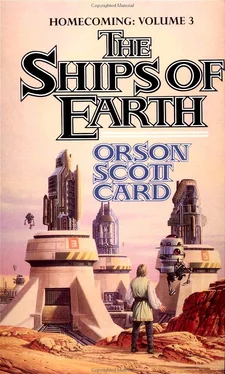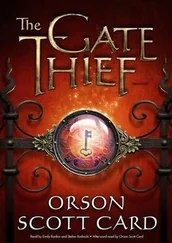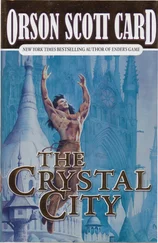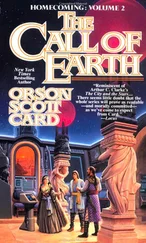Orson Card - THE SHIPS OF EARTH
Здесь есть возможность читать онлайн «Orson Card - THE SHIPS OF EARTH» весь текст электронной книги совершенно бесплатно (целиком полную версию без сокращений). В некоторых случаях можно слушать аудио, скачать через торрент в формате fb2 и присутствует краткое содержание. Жанр: Фантастика и фэнтези, на английском языке. Описание произведения, (предисловие) а так же отзывы посетителей доступны на портале библиотеки ЛибКат.
- Название:THE SHIPS OF EARTH
- Автор:
- Жанр:
- Год:неизвестен
- ISBN:нет данных
- Рейтинг книги:4 / 5. Голосов: 1
-
Избранное:Добавить в избранное
- Отзывы:
-
Ваша оценка:
- 80
- 1
- 2
- 3
- 4
- 5
THE SHIPS OF EARTH: краткое содержание, описание и аннотация
Предлагаем к чтению аннотацию, описание, краткое содержание или предисловие (зависит от того, что написал сам автор книги «THE SHIPS OF EARTH»). Если вы не нашли необходимую информацию о книге — напишите в комментариях, мы постараемся отыскать её.
THE SHIPS OF EARTH — читать онлайн бесплатно полную книгу (весь текст) целиком
Ниже представлен текст книги, разбитый по страницам. Система сохранения места последней прочитанной страницы, позволяет с удобством читать онлайн бесплатно книгу «THE SHIPS OF EARTH», без необходимости каждый раз заново искать на чём Вы остановились. Поставьте закладку, и сможете в любой момент перейти на страницу, на которой закончили чтение.
Интервал:
Закладка:
Never return.
He thought of his children—quiet, brilliant Chveya; Zhatva, wise and compassionate; mischievous Motiga; bright-spirited Izuchaya; and the little twins, Serp and Spel. Can I leave them fatherless?
I can if I must. I can because they'll have Luet as their mother, and Shuya and Issya to help her, and Father and Mother too. I can leave them if I must because that would be better than returning to them, having failed to fulfil the purpose of our lives for no reason better than fear of my own death.
He pressed against the barrier. It seemed not to give at all under his hand. The harder he pressed, the more it seemed to slide around under his hand. Yet with all that illusion of sliding, his hand did not actually slip to the right or the left, up or down. In fact, the friction seemed almost perfect—while pressing inward he couldn't slide his hand across the surface, even though it felt like the surface was madly sliding in every direction under his hand.
He stepped back, picked up a rock, and lobbed it at the barrier. It hit the invisible wall, stuck for a moment, and then gradually slid downward.
This thing isn't a wall at all, realized Nafai, not if it can grab the stone and then let it slide down. Could it even sense what the thing is that struck it, and respond differently for stones than for, say, birds?
Nafai picked up a clod of turf. He saw with satisfaction that there were several grubs and an earthworm in it. He heaved it at the barrier.
Again it stuck for a moment and then began to slide downward. But not at the same rate. The dirt went first, cleanly separated from the roots. Then all the vegetable matter slid down, leaving only the grubs and the earthworm on the face of the barrier. At last they, too, slid down.
This barrier is able to sort out what strikes it, thought Nafai.
It is able to tell the difference between living and dead, between animal and vegetable. Why not between human and nonhuman?
Nafai looked down at his own clothing. What would the barrier make of that? He had no idea how the barrier sensed the nature of the things that struck it. Perhaps it could tell before he touched it that he was human. But there was also the chance that the clothing would disguise him a little. Of course, he had no idea whether that would be good or bad.
Again he picked up a rock, but this time he didn't lob it, he threw it as hard as he could. Again it stuck on the barrier.
No, this time it stuck in the barrier. Nafai could see by pressing his hands to the barrier on either side of the stone, as it slid downward, that the stone had actually embedded itself in the barrier.
Nafai took his sling from his belt, laid a stone in the pocket, swung it vigorously, and hurled it at the barrier.
It stuck, and for a moment Nafai thought that it was going to behave like the other items.
Instead, the rock clung for a moment and then dropped down inside the barrier.
It had crossed! It had had enough momentum and it had passed through. The barrier had slowed it so much that it almost didn't make it, but it had kept just enough momentum to make it through. The only trouble was that Nafai had no idea how to hurl himself at the barrier with anything like the force that the stone had had. Even if he could, the force of striking it might kill him.
Maybe the barrier has different rules for humans. Maybe, if I try hard enough, it will let me through.
Oh, yes, of course it will, Nafai, you fool. The whole barrier system was set up to exclude humans, so of course it will let you pass through.
Nafai leaned back against the barrier to think. To his surprise, after a couple of moments the barrier began to slide him down toward the ground. Or rather, it slid his clothing toward the ground, taking him with it. It had done nothing of the kind to his hands. When he touched the wall with bare skin, it had let him stay in place and did not move him at all.
With difficulty he pulled himself away from the invisible wall. It clung to his clothing as it had held the rocks, the dirt, the grass, the grubs and the worm. There are different rules for humans, he realized. This wall does know the difference between me and my clothing.
Impulsively he stripped off his tunic, baring his arms. Then he swung his arm as fast as he could, hurling his fist into the barrier. It stung like hitting a brick wall—but it passed through.
It passed through! His fist was on the other side of the barrier, just like the stone that had passed. And where his arm stuck through the barrier he couldn't feel anything unusual at all. He could unflex his fist on the other side and wiggle his fingers, and though the air was perhaps a bit cooler there, there was no pain, no distortion, no obvious problem at all.
Can I follow my hand through the wall?
He pushed forward, and was able to slowly push his arm in right to the shoulder. But when his chest reached the barrier, he was blocked; when he twisted for a better angle, his head also came up against the barrier and stopped.
What if I'm stuck here forever—half in and half out?
In alarm he pulled away, and his arm came out easily enough. He could feel some resistance, but nothing painful, and nothing pressed against his skin to hold him. In a few moments he was free.
He touched the arm and hand that had been on the other side and couldn't find anything wrong with them. Whatever kept life from thriving on the other side hadn't killed him yet— if it was a poison, it wasn't immediate, and it certainly wasn't the barrier itself.
He reviewed the rules he had learned for crossing the wall. It had to be bare skin. He had to strike it with some force. And if he wanted his whole body through, he'd have to strike the barrier with his whole body at once.
He stripped off his clothing, folding it neatly and laying it on top of his bow and arrows. Then he piled some rocks on top of them so they wouldn't blow away. Silently he hoped that he would indeed need these clothes again.
For a moment he contemplated leaping face first against the wall, but didn't like the idea—striking it with his fist had felt like hitting a wall, after all, and he didn't relish doing that with his face or his groin. Not that it would feel wonderful to do it back-first either, but it was the lesser of two evils.
He walked a ways along the edge of the barrier until he came to a place where there was a fairly steep hill. He walked to the top and then, after a few deep breaths and a whispered farewell to his family, he ran headlong down the hill. Within moments his running was completely out of control, except that when he neared the wall he planted a foot and flung his body in a wild spin designed to lay him flat against the barrier.
Flat was not what he achieved at all. Instead his buttocks passed through first, and then, as he slowed, his thighs and his body up to the shoulders. His arms and head remained outside the barrier, even as his feet fell through and struck the stony ground on the other side. His heels hurt, but he hardly cared about that, because here he stood, his body inside, his arms and head outside.
I've got to get back outside, he thought, and try it again.
Too late. In the last moments before he stopped moving at all, his shoulders had passed inside. He was stuck again as he had been before, unable to bring his body along to follow his arms. The key difference this time was that his head was outside the barrier, and his chin and ears seemed to be reluctant to follow him inside. Worse, he couldn't even bring his arms all the way inside, because he needed the full weight of his body to pull them through, and with his chin hung up on the barrier he couldn't do it.
Читать дальшеИнтервал:
Закладка:
Похожие книги на «THE SHIPS OF EARTH»
Представляем Вашему вниманию похожие книги на «THE SHIPS OF EARTH» списком для выбора. Мы отобрали схожую по названию и смыслу литературу в надежде предоставить читателям больше вариантов отыскать новые, интересные, ещё непрочитанные произведения.
Обсуждение, отзывы о книге «THE SHIPS OF EARTH» и просто собственные мнения читателей. Оставьте ваши комментарии, напишите, что Вы думаете о произведении, его смысле или главных героях. Укажите что конкретно понравилось, а что нет, и почему Вы так считаете.









